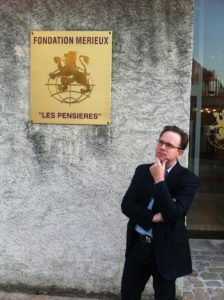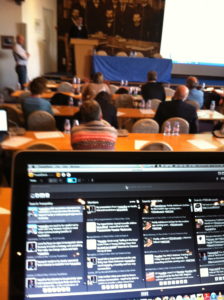 The H1N1 crisis has dramatically changed discussions around vaccines. A range of experts from different fields come together at the Merieux Foundation earlier this week. The conversation ranged from what questions were influencing public perception of vaccines to how to better understand the issues that the health community is facing today. It was fascinating to hear studies showing the impact certain rumours had on individual uptake of different kind of vaccines.
The H1N1 crisis has dramatically changed discussions around vaccines. A range of experts from different fields come together at the Merieux Foundation earlier this week. The conversation ranged from what questions were influencing public perception of vaccines to how to better understand the issues that the health community is facing today. It was fascinating to hear studies showing the impact certain rumours had on individual uptake of different kind of vaccines.
The most moving presentation came from a parent who had lost his child to the whooping cough (pertussis), reminding us why vaccines matter so profoundly to the health of our society and our children. The challenge we face however is an increasing level of scepticism from the public and intensification of rumours and scare stories spread through the web. Brian Deer, a journalist writing for the Sunday Times and the BMJ, shared his experience in investigating the case of Andrew Wakefield. Brian spoke about how he had done a long and deep investigation into the science and methodology that had gone into Andrew Wakefield’s claims and was able to dismantle his case by carefully reading a large collection of documents. He showed us that rigorous work and challenge can help to expose fraudulent claims.
 The Wellcome Trust on the other hand reminded the participants that science and vaccines are still highly trusted by the public – and that a range of initiatives had helped reinforce this understanding – but a great deal of work still needs to be done. I had the opportunity to share my experience in exploring this space online, as well as the dramatic change that the internet has brought to the way we experience information. My own conclusion from this intense discussion was that there is a need for rethink of how the health community (public and private) communicates around vaccination. The internet needs to become a core tool of communication activities and the various players need to acknowledge that the public has legitimate concerns and fears and wants to get a better understanding of what is behind the recommendations and research of the experts. A much more transparent and open discussion is needed where rather than dismissing those with concerns a real conversation begins that addresses the questions and helps to understand what choices we all need to make. In many ways this conference was a step in that direction.
The Wellcome Trust on the other hand reminded the participants that science and vaccines are still highly trusted by the public – and that a range of initiatives had helped reinforce this understanding – but a great deal of work still needs to be done. I had the opportunity to share my experience in exploring this space online, as well as the dramatic change that the internet has brought to the way we experience information. My own conclusion from this intense discussion was that there is a need for rethink of how the health community (public and private) communicates around vaccination. The internet needs to become a core tool of communication activities and the various players need to acknowledge that the public has legitimate concerns and fears and wants to get a better understanding of what is behind the recommendations and research of the experts. A much more transparent and open discussion is needed where rather than dismissing those with concerns a real conversation begins that addresses the questions and helps to understand what choices we all need to make. In many ways this conference was a step in that direction.
There was some interesting engagement on twitter during the conference (#vaxpolicy). I was particularly pleased when zdoggmd (check out his clip below) retweeted something about the conference – a great way to get the message out!
Check out my storyfication of #vaxpolicy
Cross-posted from http://www.hyperthinker.eu/2011/shifting-the-vaccine-policy-discussion/











